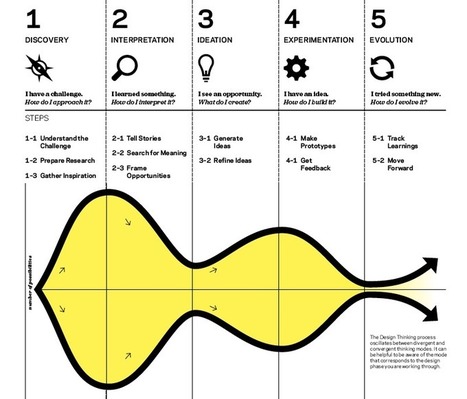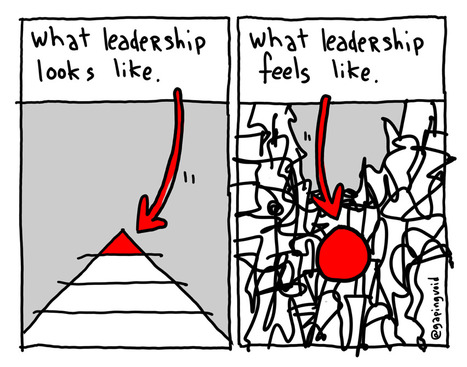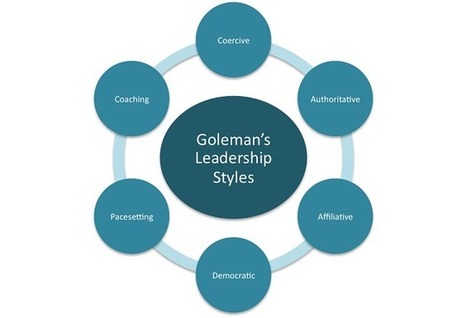Leaders’ behaviors can be very similar to the behaviors of cats and dogs. Some constantly hover around and pull you out of your work for status updates, meetings, and side projects, while others leave you completely to your own devices and are nowhere to be found when you need them. And it can be quite frustrating to deal with either.
Get Started for FREE
Sign up with Facebook Sign up with X
I don't have a Facebook or a X account

 Your new post is loading... Your new post is loading...
 Your new post is loading... Your new post is loading...

Anthony Fouqué's curator insight,
March 19, 2016 1:13 PM
This is a very good overview about the different methodologies you can apply for innovation processes.

Anthony Fouqué's curator insight,
March 19, 2016 1:14 PM
This is a very good overview about the different methodologies you can apply for innovation processes.

Fernando Gil's curator insight,
March 20, 2016 4:17 AM
This is a very good overview about the different methodologies you can apply for innovation processes.
Luciano Alibrandi's curator insight,
May 10, 2016 3:21 AM
What makes a great leader? Leaders have a purpose, they have a sharp focus, they inspire their teams. They show the way for others to follow. They genuinely push each individual to give his/her best. Great leaders share some common traits. Here's five of them. Well written article

The Learning Factor's curator insight,
April 25, 2016 6:56 PM
You don't have to be in managerial role to be a leader. Follow these tips to inspire your colleagues and reap the benefits of a happier workplace.

Arputharaj Devaraj's curator insight,
April 2, 2016 1:15 AM
True two-way conversation can break the cycle of ineffective communication. 
emma's curator insight,
April 2, 2016 1:40 AM
When leaders engage with a willingness to be influenced, others are more open to being influenced. 
Dr. Deborah Brennan's curator insight,
April 2, 2016 7:19 PM
True two-way conversation can break the cycle of ineffective communication.
Maggie Lawlor's curator insight,
December 15, 2015 2:37 AM
Slightly confusingly written article, but still worth a read! We develop leaders to be comfortable with their own vulnerability and it shifts the culture of the organisation faster than anything else I've seen across 30 years of corporate life!

The Learning Factor's curator insight,
November 15, 2015 4:58 PM
Use these approaches to leadership to become an outstanding leader. 
Lyndsay Rees-Jones's curator insight,
November 21, 2015 7:07 AM
People are your most valuable asset. Take time for them and yourself.

The Learning Factor's curator insight,
October 5, 2015 6:22 PM
It's easy to be a good leader, but do you have what it takes to be genuinely exceptional?

The Learning Factor's curator insight,
June 8, 2015 7:14 PM
Ask yourself these 5 questions, create impact, breathe, and have an awesome first day of the working week!

The Learning Factor's curator insight,
April 19, 2015 6:51 PM
Power makes lots of us uncomfortable, but that's no excuse for sticking your head in the sand and not cultivating your professional clout

The Learning Factor's curator insight,
December 7, 2014 4:21 PM
Carnegie says that "successful leaders in all walks of life" exemplify a set of specific traits, with the best possessing all of them. Take a look at the summary of these skills.

The Learning Factor's curator insight,
June 24, 2014 6:28 PM
This study explores the perceptions of over 6,500 people in 13 countries on five continents regarding effective leadership, effective communication and the intrinsic link between the two. |

rodrick rajive lal's curator insight,
May 12, 2016 11:22 PM
Women make for good leaders, and it is high time we accepted this as an emerging reality. In the education sector, especially school education, women are more successful as principals and managers. The reason is perhaps that they are less likey to make wrong decisions under duress.

S3 Inc's curator insight,
May 26, 2016 1:53 PM
S3 Inc is a women owned technical services company. Learn about the differences between men and women in decision-making and its importance in business in this article from Forbes.

TeamHousingSolutions's curator insight,
May 10, 2016 11:42 AM
Run Meetings That Are Fair to Introverts, Women, and Remote Workers

The Learning Factor's curator insight,
December 20, 2015 4:58 PM
As a player, coach, and manager, Alex Ferguson learned the importance of discipline and thinking long term. 
malek's curator insight,
December 21, 2015 4:54 PM
Not a typical soccer manager, more of a happiness magicians

The Learning Factor's curator insight,
November 29, 2015 4:52 PM
Not only will gratitude affect the quality of your life, it may also change the length of it.

The Learning Factor's curator insight,
November 15, 2015 4:31 PM
Putting people at the heart of your business strategy is the way to start reshaping a heartless system.

The Learning Factor's curator insight,
June 18, 2015 7:53 PM
Great Leaders don't get there by accident. Here Inc. columnists share the best tools to lead and succeed.
Michael Jackson's curator insight,
June 19, 2015 2:04 AM
Book Cheap London Theatre Tickets to all West End Theatre and London Shows plus Theatre Packages & Special Offer Theatre Tickets

www.whatawaist.ca's curator insight,
June 20, 2015 11:20 PM
LADIES ITS ALMOST SUMMER, GET STARTED NOW!!!!!!!
Perfect for post baby to get your tummy to snap back! it has way more support then the belly bandit does and won't ride up, or it is meant for anyone who wants to waist train!! visit www.whatawaist.ca if you are interested!! Please message me with any questions you might have! We have more products on our site with more to come!!! www.whatawaist.ca

The Learning Factor's curator insight,
May 21, 2015 6:49 PM
Too many of us are missing a critical element when it comes to our lives - happiness. Read on for the amazing secrets of the happiest leaders.

The Learning Factor's curator insight,
February 3, 2015 4:17 PM
Stability, resilience, and relationships are the keys to thriving amid geopolitical crises.

The Learning Factor's curator insight,
June 30, 2014 5:52 PM
Leaders need to consider that performance is best measured by the value they generate, not the hours they put in. 
Graeme Reid's curator insight,
July 1, 2014 8:16 PM
People feel better and perform better and more sustainably when four basic needs are met: renewal (physical); value (emotional), focus (mental) and purpose (spiritual).

Lauran Star's curator insight,
September 21, 2014 2:56 PM
While type does matter - I believe a successful leader has a bit of all 
Dian J Harrison, MSW, MPA's curator insight,
February 5, 2015 6:51 PM
What is your leadership style! 
CCM Consultancy's curator insight,
July 17, 2018 2:16 AM
The best leaders don’t know just one style of leadership – they are skilled at several, and have the flexibility to switch between styles as the circumstances dictate. |






































